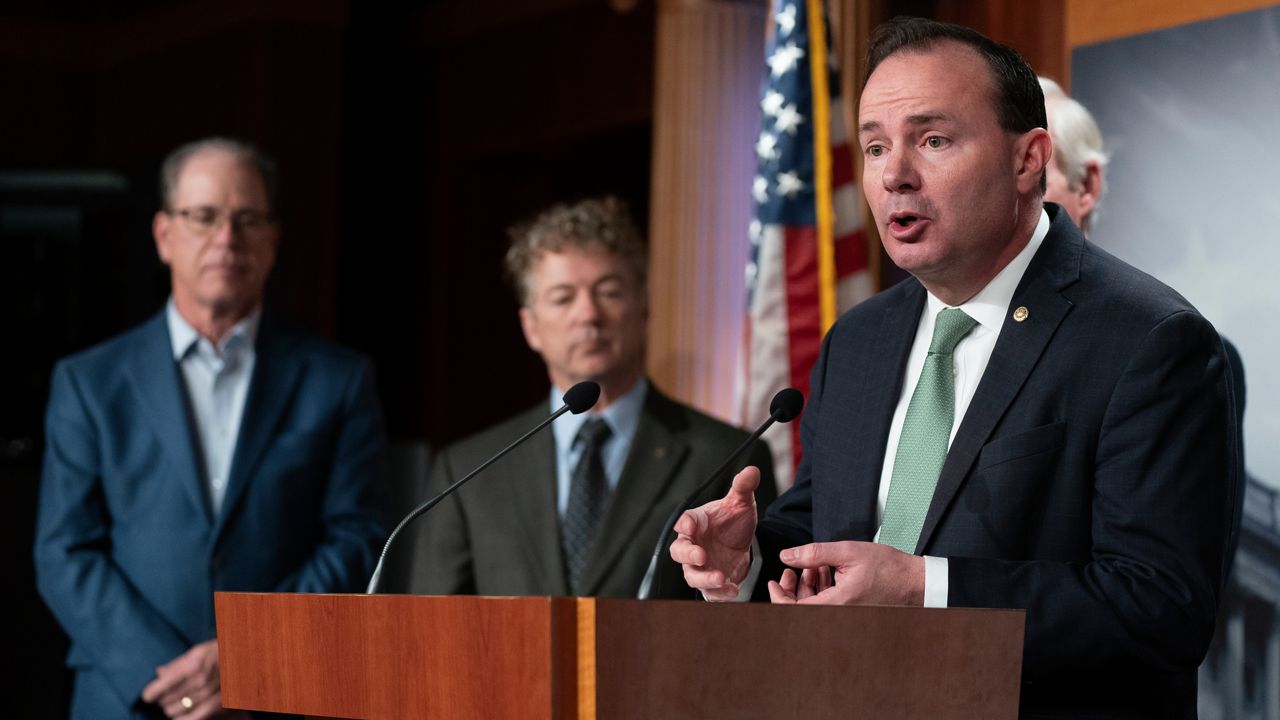A group of two dozen Senate Republicans sent a letter to President Joe Biden on Friday vowing to vote against any bill to increase the debt ceiling that does not include "real structural spending reform that reduces deficit spending and brings fiscal sanity back to Washington."
"It is the policy of the Senate Republican conference 'that any increase in the debt ceiling must be accompanied by cuts in federal spending of an equal or greater amount as the debt ceiling increase, or meaningful structural reform in spending,'" the group, led by Utah Sen. Mike Lee, wrote. "We intend to stand by that policy."
The letter is the latest salvo in the ongoing skirmish between lawmakers over raising the debt ceiling after the U.S. hit the $31.4 trillion limit last week. Treasury Secretary Janet Yellen said that the department has begun taking "extraordinary measures" to allow the country to pay its debts, which are expected to run out in June. She urged lawmakers to come together on an agreement to raise the debt limit before the country defaults for the first time in its history.
Republicans want to tie a debt ceiling increase to spending cuts, saying that they would only raise the limit to secure an overhaul in federal spending. Democrats, on the other hand, argue that Congress has voted to raise the borrowing limit numerous times under presidents of both parties. They've also warned that not raising the debt ceiling would have a devastating impact on the global economy.
President Joe Biden and House Speaker Kevin McCarthy have agreed to meet to discuss the debt ceiling, but a date for that meeting has not yet been set. McCarthy is pushing for a return to fiscal year 2022 spending levels — a roughly 8% budget cut — a promise he made to conservative holdouts in his lengthy campaign to become speaker.
Earlier this week, Senate Minority Leader Mitch McConnell, R-Ky., made it clear that any agreement to raise the debt ceiling will have to be hashed out between the White House and House Republicans, led by Speaker McCarthy.
“I can't imagine any kind of debt ceiling measure that can pass the Senate would also pass the House,” McConnell told reporters, adding: “In this current situation, the debt ceiling fix, if there is one … will have to come out of the House.”
Despite McConnell's comments, the group of two dozen lawmakers – which includes two members of Senate GOP leadership, Sens. John Barrasso, R-Wyo., and Joni Ernst, R-Iowa – are backing the demands of their House Republican counterparts. The lawmakers wrote that the United States' "fiscal policy is a disaster" and accused the Biden administration of wasteful spending on the COVID-19 pandemic, funding the IRS and other areas.
"Americans are keenly aware that their government is not only failing to work for them — but actively working against them," the letter reads. "We do not intend to vote for a debt-ceiling increase without structural reforms to address current and future fiscal realities, actually enforce the budget and spending rules on the books, and manage out-of-control government policies."
Other lawmakers who signed the letter include Sens. Ted Budd, R-N.C., Rand Paul, R-Ky., Rick Scott, R-Fla., J.D. Vance, R-Ohio, Ron Johnson, R-Wisc., and Ted Cruz, R-Texas.
Some Democrats have encouraged the Biden administration to negotiate with McCarthy. West Virginia Sen. Joe Manchin, a powerful moderate in the caucus, met with McCarthy on Wednesday to discuss the debt ceiling, and encouraged his fellow Democrats to have conversations to address the nation's debt.
"You've got to talk, you've got to converse with with all people up here and all sides with different opinions," Manchin said on CNN on Friday, adding: "We have to recognize we have a $31.5 trillion dollar debt that's not getting any smaller, and we're right now writing checks our children can't cash. We have a responsibility to say this debt ... it's unacceptable, it's just wrong."
Manchin recalled the brinksmanship in 2011 over the debt ceiling, which led to the first-ever downgrade of the country's credit rating: "2011 didn't didn't work out well for anybody, and a lot of people were harmed, and we shouldn't go through that again."
"There should be conversations going on, and communication is how we're going to basically start addressing this debt," Manchin said.
Manchin also told the outlet that he came away from his meeting with the assurance that McCarthy "has no intention" of cutting Medicare or Social Security.
Other Democrats are urging House Republicans to present a plan.
"There is a difference between a compromise and a ransom note," House Democratic Leader Hakeem Jeffries, D-N.Y., told NPR this week. "We are not going to pay a ransom note to extremists in the other party."
"Leader McConnell said something yesterday that I think is right on the mark: He said that when it comes to moving a debt ceiling proposal through Congress, the House should go first," Senate Majority Leader Chuck Schumer, D-N.Y., said on the Senate floor on Wednesday. "He is correct, and not only should the House go first, but [House Republicans] must quickly show the American people what their plan actually is for avoiding a first-ever default on the national debt."
"So far, we haven’t heard anything beyond vague and troubling talking points about the need to cut federal spending," he continued.
In an interview with Bloomberg, Treasury Secretary Yellen warned that the only way the country will be able to avoid default is by raising the debt limit.
"It’s overly necessary for Congress to raise the debt limit, and I hope they do so in a timely way before we come to a crisis," Yellen said.



